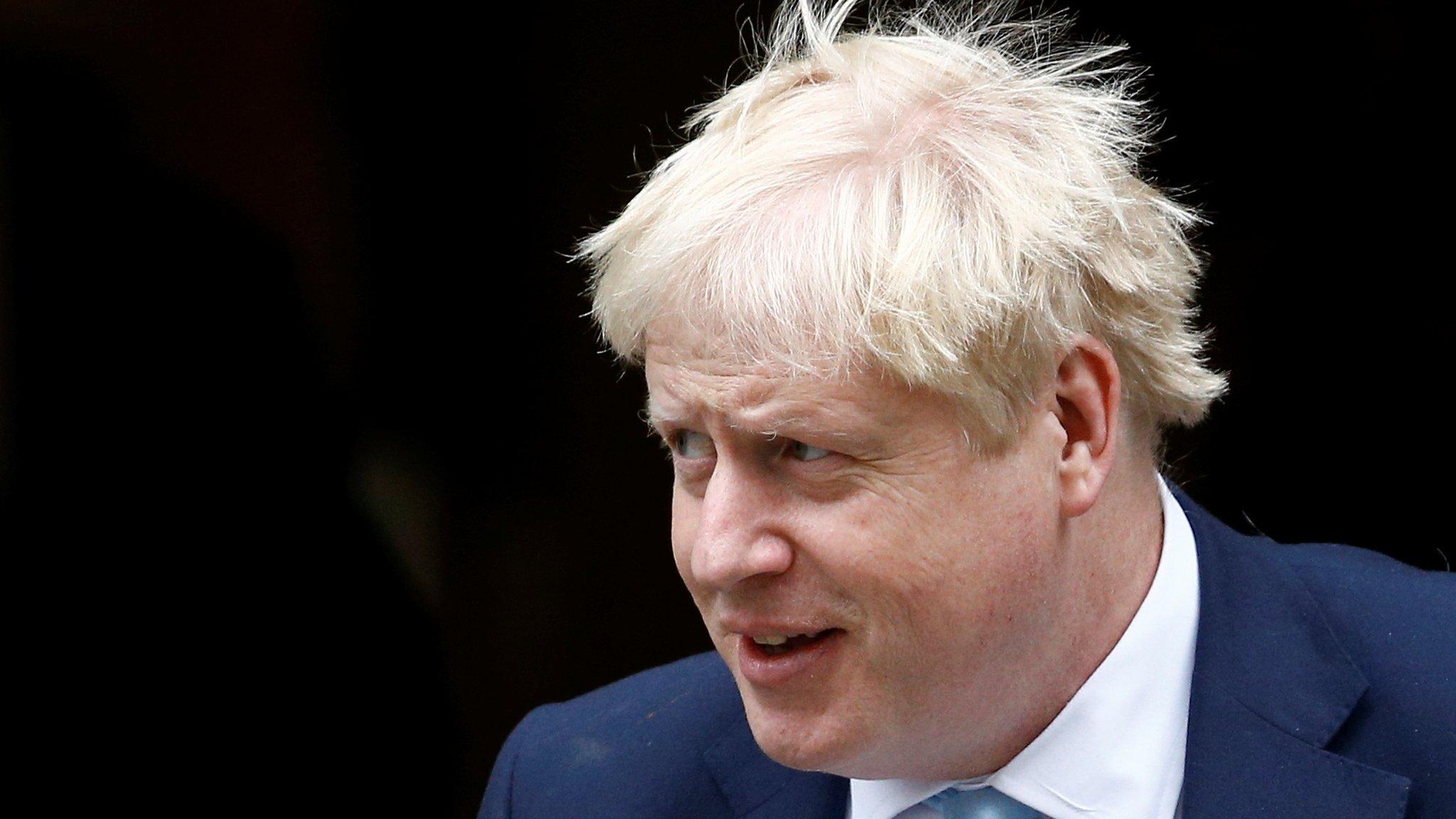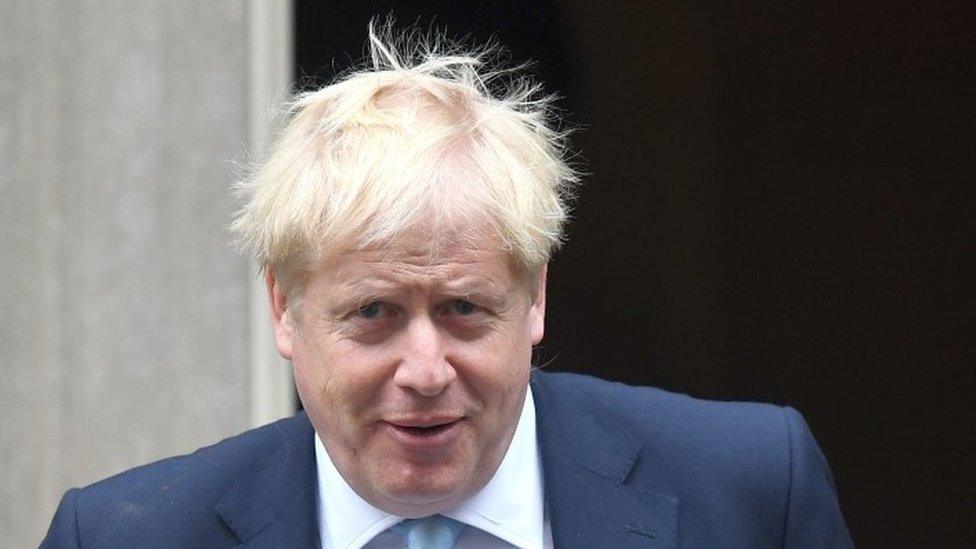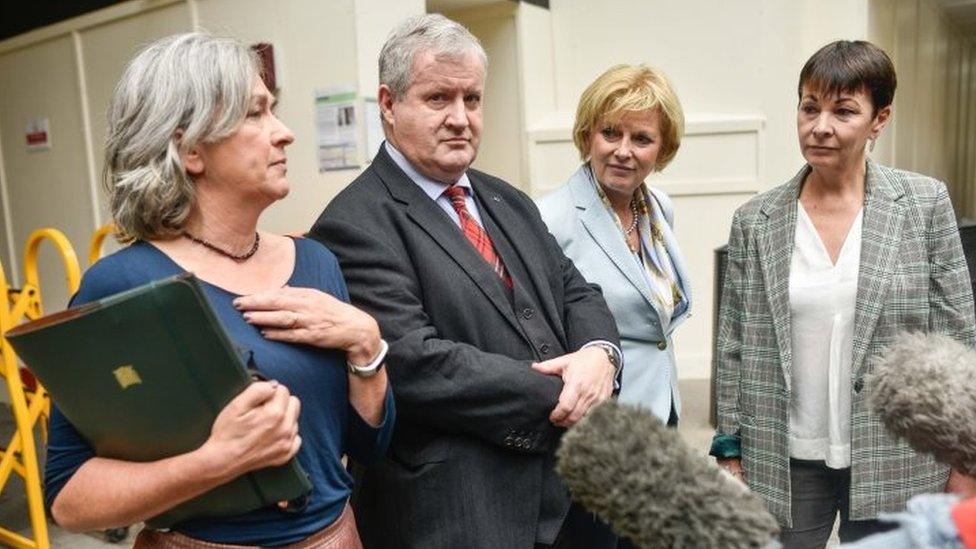PM calls on EU to 'thrash out' Brexit objections
- Published
- comments
UK Brexit proposals "very fair" and "generous", says PM
Boris Johnson has called on the EU to enter detailed talks to "thrash out" its objections to his latest Brexit proposals.
The prime minister said the UK plans were a "big concession", but European leaders had not offered specific criticism of his ideas.
French President Emmanuel Macron says the EU will decide at the end of the week whether a new deal is possible.
Mr Johnson held further telephone calls with EU counterparts on Monday.
Meanwhile, a Scottish court has dismissed a call for it to issue an order to compel the PM to comply with a law which would force him to seek a Brexit delay.
Under legislation passed by MPs last month - the Benn Act - Mr Johnson must write to the EU requesting a further delay if no deal is signed off by Parliament by 19 October, unless MPs agree to a no-deal Brexit.
Downing Street said the PM held phone calls with the leaders of Sweden, Denmark and Poland, after speaking to Mr Macron on Sunday.
The prime minister told the French president over the phone he believed a deal could be achieved, but the EU must match compromises made by the UK.
Speaking to reporters on Monday, Mr Johnson said: "What we're saying to our friends is: this is a very fair, generous and reasonable offer we've made.
"We haven't really heard the detail from them about what they think the problems are. It's time for us to get together and really thrash this thing out."
His remarks come at the start of a key few days of negotiations as both parties try to find a new agreement in time for a summit of European leaders on 17 and 18 October.
'Fundamental changes'
Arrangements for preventing a hard border on the island of Ireland continue to be a sticking point, with the EU calling for "fundamental changes" to the UK's latest proposals, which were unveiled last week.
According to a briefing given to European diplomats on Monday, the European Commission was "nonplussed" about being asked to rule out any checks on the Irish border when it was unclear what controls the UK was intending elsewhere in Northern Ireland.
The BBC's Adam Fleming said it is understood the EU was also concerned that the UK wanted to have continued access to several EU trade databases, even if Northern Ireland's Stormont Assembly withheld its consent for the new regulatory and customs arrangements.
A UK government spokesperson said Mr Johnson's Europe adviser David Frost would continue talks with EU officials on Tuesday after the UK provided "additional legal text" on the British proposals.
"This provided further technical detail on customs and goods regulations to further clarify how the UK's proposals would operate," the spokesperson added.
Brexit Secretary Stephen Barclay will also visit EU capitals this week as part of an effort to drum up support for the PM's plans.

What are the PM's border plans?
Under Mr Johnson's proposals, which he calls a "broad landing zone" for a new deal with the EU:
Northern Ireland would leave the EU's customs union alongside the rest of the UK, at the start of 2021
But Northern Ireland would continue to apply EU legislation relating to agricultural and other products, if the Northern Ireland Assembly approves
This arrangement could, in theory, continue indefinitely, but the consent of Northern Ireland's politicians would have to be sought every four years
Customs checks on goods traded between the UK and EU would be "decentralised", with paperwork submitted electronically and only a "very small number" of physical checks
These checks should take place away from the border itself, at business premises or at "other points in the supply chain"

Speaking after meeting Mr Barclay, Dutch foreign minister Stef Blok urged "more realism and clarity" from the UK this week.
"Important questions still remain on [the] UK Brexit proposals," he tweeted, external.
Irish Prime Minister Leo Varadkar has previously said he did not understand how tariff checks could be avoided if Northern Ireland left the EU's customs union.
He also raised concerns about Mr Johnson's plan to give the Northern Ireland Assembly a vote over entering into a "regulatory zone" with the EU.
He said the views of the "whole population of Northern Ireland" should be represented, and no one party should have a "veto" over the idea.
Last week in Brexit: The PM revealed his plan to attempt to "get Brexit done"
Meanwhile, opposition leaders have met to discuss the prime minister's border proposals together for the first time, and to consider how they might be able to force him to comply with the terms of the Benn Act.
But a planned attempt from opposition parties to pave the way for MPs to take control of the Commons agenda from next week has stalled.
The move was aimed at allowing them to pass more emergency laws on no-deal, or demand more documents in the run-up to 31 October.
The BBC's Nick Eardley says the idea failed to win the backing of former Tory MPs expelled from the party last month, after they decided to give No 10 more time to try and get a new deal with Brussels.
After Monday's meeting, Liberal Democrat leader Jo Swinson said she was concerned at Labour's continuing insistence that Jeremy Corbyn must lead any so-called government of national unity created to replace Mr Johnson.
She said Mr Corbyn could not command the numbers in the House of Commons to make an interim government viable and failing to see that made a no-deal Brexit more likely.
Allow X content?
This article contains content provided by X. We ask for your permission before anything is loaded, as they may be using cookies and other technologies. You may want to read X’s cookie policy, external and privacy policy, external before accepting. To view this content choose ‘accept and continue’.

Labour has pressed the government to publish its proposed legal text to replace the existing Irish border backstop plan, which it has shared with EU officials.
Shadow Brexit secretary Sir Keir Starmer said the document could contradict the PM's claim, made last week, that his plans would not require any "physical infrastructure" to make them work.
But Brexit minister James Duddridge said publishing the text now could "get in the way of getting a deal", adding that talks were at a "sensitive" stage.
He told the Commons that the government would only publish the text "when doing so will assist the negotiations".

Timeline: What's happening ahead of Brexit deadline?
Tuesday 8 October - Last working day in the House of Commons before it is due to be prorogued - suspended - ahead of a Queen's Speech to begin a new parliamentary session.
Monday 14 October - The Commons is due to return, and the government will use the Queen's Speech to set out its legislative agenda. The speech will then be debated by MPs throughout the week.
Thursday 17 October - Crucial two-day summit of EU leaders begins in Brussels. This is the last such meeting currently scheduled before the Brexit deadline.
Saturday 19 October - Date by which the PM must ask the EU for another delay to Brexit under the Benn Act, if no Brexit deal has been approved by Parliament and they have not agreed to the UK leaving with no-deal.
Thursday 31 October - Date by which the UK is due to leave the EU, with or without a withdrawal agreement.

- Published4 October 2019

- Published4 October 2019

- Published7 October 2019

